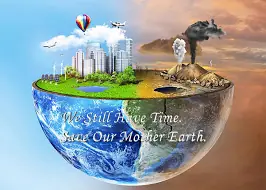The world celebrated April 22nd as Earth Day last week. Incessant human activities since the Industrial Revolution have released large amounts of carbon dioxide and other greenhouse gases into the atmosphere, which has changed the earth’s climate greatly over the last century.
Scientists have pieced together a record of the earth’s climate by analyzing a number of indirect measures of climate, such as ice cores, tree rings, glacier lengths, pollen remains, ocean sediments, and by studying changes in the earth’s orbit around the sun. Carbon dioxide, methane, and nitrous oxide concentrations are now found in large amounts in the earth’s atmosphere more than at any given time in the last 800,000 years. These greenhouse gas emissions have increased the greenhouse effect and caused the earth’s surface temperature to rise. Burning fossil fuels affects climate change more than any other human activity. Warfare and weapons, and their manufacturing processes, are huge contributors to noxious and colossus global waste.
One Planet Living is the vision of a world where everyone, everywhere, lives happy and healthy lives, within the limits of the planet and with a straightforward framework to achieve this.
People and projects around the world must use the framework to cut down on what we throw away. Conserve natural resources and reduce landfill space. Volunteer for cleanups in and around the community one lives. When you further your own education, you can help others understand the importance and value of our natural resources. The less water you use, the less runoff and wastewater that eventually ends up in rivers. Buy less plastic, carry a reusable shopping bag. Energy efficient light bulbs reduce greenhouse gas emissions. Flip the light switch off when you leave the room. Plant trees to provide food and oxygen. Trees help save energy, clean the air, and help combat climate change. Choose non-toxic chemicals in homes and offices. Drive less and use public transport or, walk wherever one can. Say No to wars!
Farmers around the world must switch to natural farming by reducing use of toxic chemicals and pesticides.
Based on the 2022 Climate Change Performance Index, Denmark was ranked as country with the highest achievement in climate protection, followed by Sweden. Sweden has set its goal to reach net-zero emissions by 2045, and UK, Norway, France and New Zealand are others that have legally committed to reach net zero emissions by 2050.
At the (CoP26) Conference, India’s Prime Minister Modi declared a five-fold strategy termed as panchamrita to achieve this feat. He also committed India will target its non-fossil energy capacity to reach 500 Gigawatt (GW) by 2030. India will try to meet 50 percent of its energy requirements from renewable energy by 2030 and reduce the total projected carbon emissions by one billion tons, with which, India will reduce the carbon intensity of its economy by about 45 percent. At this rate, hopefully by year 2070, India will achieve the target of Net Zero.
After four years of near-silence on climate change at the White House, President Biden has turned it into one of the defining issues of his presidency, proposing ambitious efforts to replace fossil fuels with clean energy sources and lead a global campaign to cut greenhouse gases.







